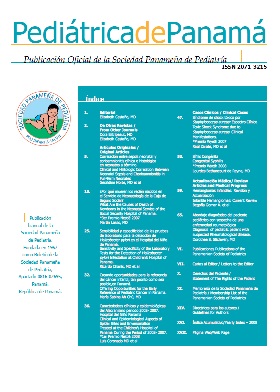Screening of congenital heart disease in neonates through pulse oximetry. Hospital Materno Infantil José Domingo de Obaldia. August 2014 - February 2015
Authors
DOI:
https://doi.org/10.37980/im.journal.rspp.20181608Keywords:
Screening, heart disease, congenital, pulse oximetryAbstract
Introduction. There is solid evidence that demonstrate the utility of testing in a systematic way of oxygen saturation all the healthy newborn infants apparently after 24 hours old and within 48 hours; This proof has been called “screening neonatal for congenital heart disease" and serves to opportunely detect congenital structural cardiac abnormalities that present with hypoxemia. Sieve of congenital heart disease may help recognize them early and facilitate their better development. Objectives. Evaluate the use of pulse oximetry as a tool for detection of congenital heart diseases in the newborn asymptomatic. Results. The cardiac screening using pulse oximetry test was performed to healthy newborns 2236 asymptomatic, born in the Hospital Materno Infantil José Domingo de Obaldía (HMIJDDO) in a period of six months (August 2014-February 2015). This sample was obtained a positive screen in 16 of the newborns assessed (0.72%). Which was les echo reported: 6 (37.50%) with a structurally normal heart, 6 (37.50%) Arteriosus persistent ductus, 3 (18.75%) Anomalous pulmonary venous connections. And only in one case (6.25%) presented a right hypoplastic ventricle, tricuspid valve, pulmonary Atresia hypoplasia syndrome vs valve stenosis-criticism in dome, large patent ductus arteriosus and tortuous, suspicion of ventricle-coronary fistula. Conclusion. Parents and physicians should know that a normal saturation test, doesn´t rule out the presence of other congenital heart disease who dont present with hypoxemia. Once we have trained staff who perform this screening, we can put the oximetry as a control for all, not as an isolated sieve, but one fact more for a pathophysiology that we are thinking.
Downloads
Published
Issue
Section
License
Copyright (c) 2020 Infomedic InternationalDerechos autoriales y de reproducibilidad. La Revista Pediátrica de Panamá es un ente académico, sin fines de lucro, que forma parte de la Sociedad Panameña de Pediatría. Sus publicaciones son de tipo gratuito, para uso individual y académico. El autor, al publicar en la Revista otorga sus derechos permanente para que su contenido sea editado por la Sociedad y distribuido Infomedic International bajo la Licencia de uso de distribución. Las polítcas de distribución dependerán del tipo de envío seleccionado por el autor.






